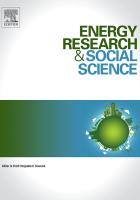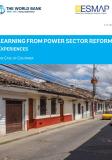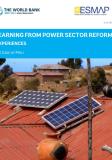Publications
This study adopted a qualitative approach to gain a first-hand perspective of men on this issue, and to compare findings with that of women in order to identify any similarities and gaps that could shape the eventual outcome of acquisition of cleaner cookstoves (CCS).
Current research on cleaner cookstoves (CCS) is focused primarily on women, thus removing men from the cookstove adoption equation despite their decision-making role in households. Very little is understood about what would motivate men to purchase CCS, and whether such motivations are key factors that influence a household’s decision to acquire CCS. There is a paucity of comparative analyses of men and women perspectives on this topic. This study adopted a qualitative approach to gain a first-hand perspective of men on this issue, and to compare findings with that of women in order to identify any similarities and gaps that could shape the eventual outcome of acquisition of a CCS. Contrary to published literature of women’s perception of men as being naïve to the challenges associated with traditional cookstoves, we find men in our study to be highly aware of such challenges, having experienced them as child-cooks while growing up.
However, this awareness does not translate into an interest in purchasing CCS. While women expressed a strong desire for CCS, men who wield power over decisions to acquire CCS viewed them as status symbols, unnecessary and unattainable. This gender imbalance in motivation and power forecloses opportunities for household adoption of CCS. We recommend that programs should equally target men with CCS messaging, bundle cookstoves with other products that men value, and take advantage of women’s groups as a source of collective bargaining power for women in the acquisition of CCS.
Caroline A. Ochienga,b, Una Murraya, c, John Owuord, Charles Spillanea ELSEVIER: Energy Research & Social Science | Volume 74, April 2021, 101913. The Forgotten Half: Men’s Influence Over Cookstove Adoption Decisions in Northern Kenya. Available online 2/17/21.
a Ryan Institute, National University of Ireland Galway, University Road, Galway H91 REW4, Ireland
b Energy Sector Management Assistance Program, The World Bank, 1818 H Street, NW., Washington DC 20433, USA
c MSc Climate Change, Agriculture and Food Security Program (MScCCAFS), National University of Ireland Galway, University Road, Galway H91 REW4, Ireland
d Swedish Program for ICT in Developing Countries, Borgarfjordsgatan 12, 164 55 Kista, Stockholm, Sweden
Under a Creative Commons license.



